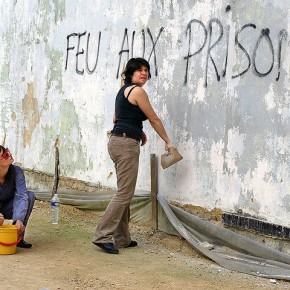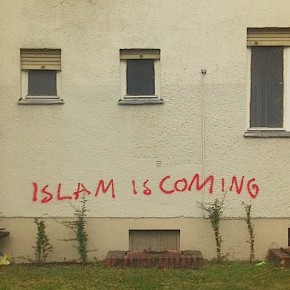This month, as Germany accepted the mantle of World Cup Champions in football, my home town of Berlin was awash in both World Cup merriment and a sea of contradictions. On the news, pictures of the victorious German team ran alongside headlines about bombings in Gaza, creating an awkward clash of emotion, forcing me to wonder if anyone else was connecting the dots.
Huge firework displays, accompanied by the waving of German flags, welcomed the team home; and all the while the city’s streets were filled with immigrants, struggling to survive. Cheers of “Deutschland” rung out at the same time that a huge pro-Palestinian demonstration kicked off in the city centre, triggering the police to come out in full force.
Many Germans are fully aware of the delicate consequences of fervent nationalism, as well as the need to support victims of the Nazi Holocaust. All four of my Jewish grandparents suffered terribly through the Holocaust, and it pains me deeply to think that their torment has led to any sort of bloodshed, rather than a call to action that emphasises the importance of confronting injustice.
However, Palestine has always been a tricky subject. The inclination towards supporting Israel, which was created in the shadow of the horrors of Nazi Germany, often leads to hostility with any group in solidarity with Palestinian people.
This week marks the centenary of the outbreak of WWI. With the 70th anniversary of the end of WWII just around the corner in 2015, the crucial question remains: How do we remember the Holocaust? As the death toll in Gaza reaches 1400, any answers that don’t allow us to criticise Israeli policy are shallow. It continues to strike me as darkly humorous that while the Israeli right continues to politicise the Holocaust to achieve its objectives, it willingly disregards the exact principles of human rights that the horrors of Nazi Germany showcased as necessary in the first place.

Israel (and the media) have grown accustomed to the habit of not being able to mention Israel without speaking of Jewish people – and yet, they are not necessarily one in the same. Separation of the two is necessary to critically evaluate the current situation, without the emotive links to the Holocaust. When we talk about Palestinians, we don’t automatically say “Muslim”, so why, pragmatically, should we not do the same for Israel?
The Holocaust arose from more than just an evil mindset. It was the culmination of a huge variety of disparate trends in central Europe: including bureaucratic thinking, imperial excess and economic recession. Some people say that there is a “Holocaust against the Palestinians”, but that is far too crude an expression to reflect what is actually going on. Rather, and tragically, no one has learned their lessons. We say “Never Again”, but what does that actually mean if the oppressive structures and attitudes that gave rise to the Holocaust are still perpetuating new forms of injustice, especially in places like Gaza?

The conversations surrounding the two world war anniversaries are becoming louder. Earlier this month, a growing number of descendants of the Holocaust, and their allies in Berlin, asked these questions through launching a campaign that seeks to explore Holocaust memorialisation. ‘Never Again. Full Stop!‘ is an attempt to understand the variety of ways in which the grandchildren of those affected by the period are able to process the feelings of grief that the Nazi genocide provokes. It pushes against the ideas that the Holocaust must be commemorated in an apolitical way, and that it cannot be connected to other historical events. Instead, it encourages more subtlety, life-affirming and creative activism, as well as direct action against a world system that depends on, and perpetuates, bloody conflict and death.
Next year, global leaders will be celebrating the 70th anniversary of the liberation of all of the Nazi concentration camps and ghettos. However, can memorials ever bring harmony to our troubled world in the absence of true dialogue and action? The problem is not only that a lot of the struggles that gave way to the Holocaust are still being fought. It is also that the Holocaust continues to be politicised for the sake of justifying new forms of oppression against Arabs, Palestinians in particular. Wretchedly, Israel’s policy has basically turned the phrase “Never Again” into “Never Again For Us.”
Rather than using the Nazi genocide as a means to understand the horrors of a world that isn’t based on an enshrined notion of collective humanity, it has been cited as evidence for why the Israel Defence Forces (IDF) should kill Gazans with impunity. Paradoxically, and of course tragically, this means the conflict in Israel-Palestine is a direct consequence of the Holocaust, and European anti-Semitism. The Palestinians are themselves one of the Holocaust’s most unsung victims, since they continue to be murdered in its philosophical and ideological fallout, seven decades after it concluded.
Like me, descendants of Holocaust survivors, and their allies, find this unacceptable. I’m encouraged by the intention of Never Again. Full Stop! to mark the 70th anniversary of the war’s conclusion in 2015 through anti-war activism and education rather than traditionally apolitical memorials. As young people today become frustrated with empty war-memorial slogans, it’s a movement we may not be able to afford to ignore.
Apart from Jewish Holocaust descendants, a wide range of groups, such as the grandchildren of Hiroshima survivors Dresden bombing survivors, Nazis, Zionists, Partisans, LGBQTI victims, Africans, intelligensia, conscientious objectors, the mentally abused, and descendants of other international conflicts are coming together. They are united around the topic of understanding Holocaust trauma, and the need for unravelling the type of society that spawned it in the first place. This cannot include a mentality that paints Palestinians as a threat to Israel as a Jewish state, one which regularly harasses and deprives them of their liberty, in order to feed into a desperate need for national belonging.
So long as that is taking place, the Holocaust will not strictly speaking “end” at all. The Jewish spirit will continue to be traumatised by the horrors of Nazi Germany, and driven to bloody carnage as a result.
Photographs courtesy of Joel Schalit





